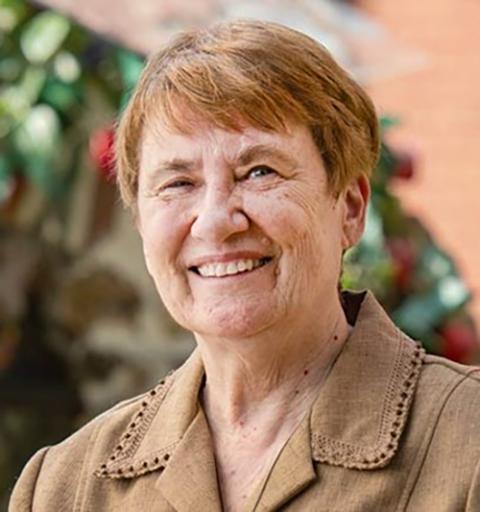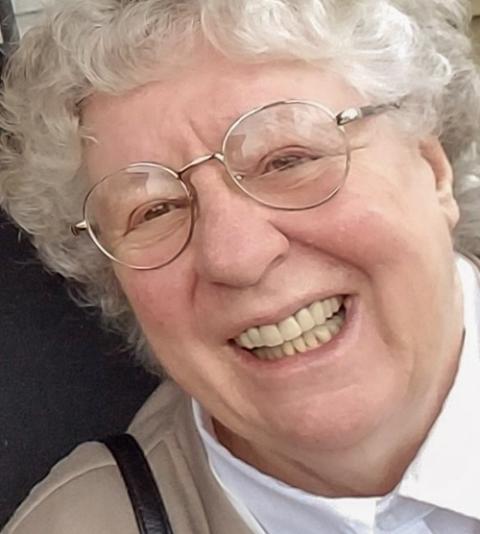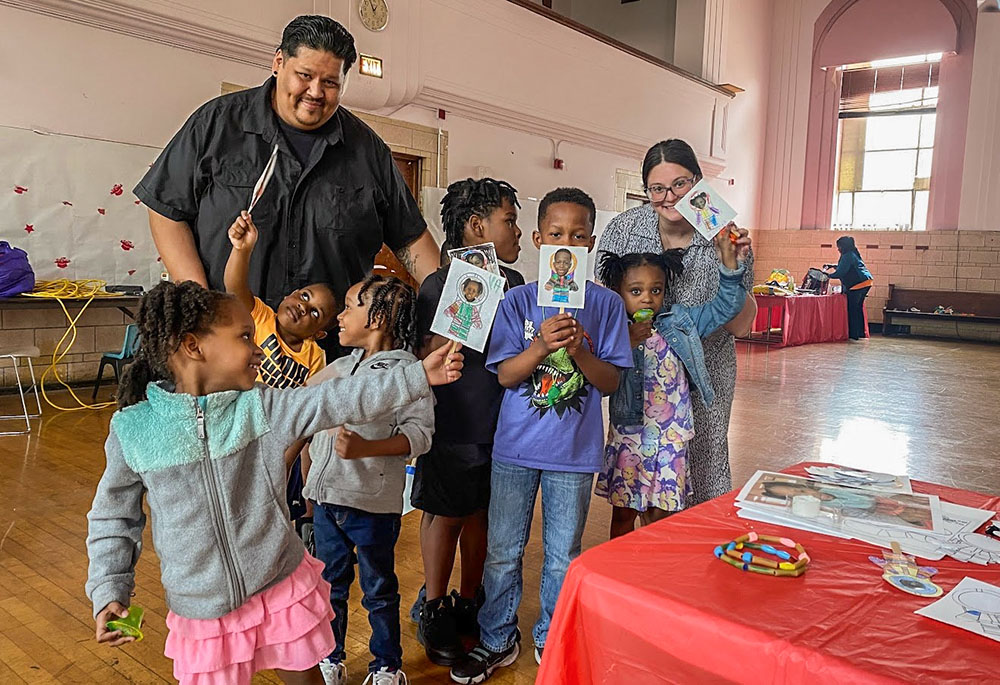
United Stand staff members Guillermo Rodriguez and Monica Kaczmarczyk pose with Chicago children displaying artwork they created at one of the nonprofit’s programs. (Courtesy of United Stand)
Sr. Margaret Eder recalls every challenge she watched a Chicago boy endure.
Living with autism spectrum disorder, the young boy struggled academically and experienced bullying. After his mother had a stroke, he later cared for his ailing father as they fell into financial hardship.
"It seemed like everything was against him," remembered Eder, 85, a Felician Sister of North America who lives in Chicago.
Fortunately, the boy didn't shoulder these emotional burdens alone.
That's because Eder — who holds master's degrees in school counseling and pastoral counseling — served as his assigned counselor for several years through her work with United Stand, a Chicago nonprofit affiliated with the Felician Sisters of North America.
Eder provided weekly counseling sessions with the boy, as she did with hundreds of other youth. Collaborating with his teachers and family, Eder helped him set and achieve academic goals, address bullying and cope with family struggles.
Today, the young man lives on his own and attends Loyola University Chicago.
"In the majority of United Stand's cases, you just hung in with that child all year, and little by little, you saw the pieces coming together," said Eder, who recently retired after 25 years with the organization.
The counseling sessions, she said, "gave them courage to go out and believe, 'I can do this.' "
This represents just a fraction of United Stand's impact. The nonprofit provides support programs such as prevention, assessment, counseling, crisis intervention and inclusive education services for up to 12,000 children, adolescents and their families each year in the Chicago area.
Founded in 1987 by United Stand's executive director and clinical director Felician Sr. Kim Mis, the agency helps youths across roughly 50 Chicago schools manage and overcome stress, conflict and violence they encounter daily.
"United Stand is my Chicago version of what Angela Truszkowska, the foundress of the Felicians, would do to meet the needs of the times if she were here," said Mis, 76, who holds a doctorate in clinical psychology. "We are a voice of hope for those who cannot find help during their most challenging moments."
A collaborative program
A native of La Salle, Illinois, Mis launched United Stand while living with her religious community in Chicago and pursuing her doctorate at the Illinois School of Professional Psychology. While training at residential treatment homes with nonprofit Mercy Home for Boys and Girls, Mis secured a grant from the agency's superintendent to create United Stand.
Early on, the nonprofit worked directly with Chicago Catholic schools, also becoming a vendor for Chicago Public Schools, to increase academic and social-emotional services for children and families under federal program dollars.
"I saw how many kids were struggling, not because they couldn't learn, but because of all the trauma experiences they had had," said Mis, adding that every staff member is trained in trauma-informed practices. "Many children are dealing with social emotional issues of all kinds."
The extensive need led United Stand to partner with Chicago universities to train teams of mental health experts in providing the nonprofit's services, Mis said. To address every need, team members' specialties span clinical psychology, family therapy, behavior management, music therapy, play therapy, brain-informed movement and more.
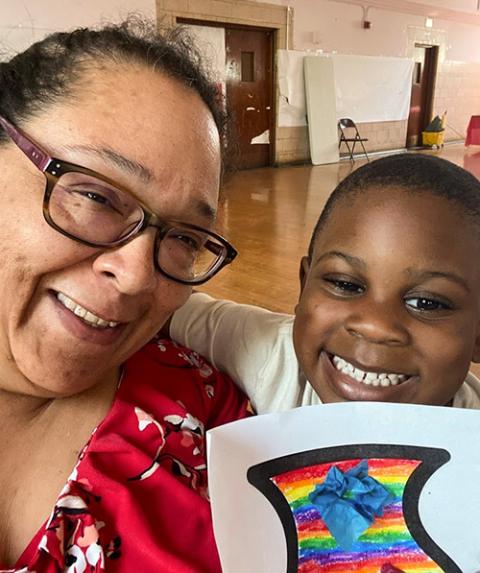
United Stand staff member Miriam Munoz poses with a child and the art he created at a United Stand program. (Courtesy of United Stand)
With 70 staff members today, including mental health professionals, agency and program administrators, and school site supervisors, United Stand serves preschool through high school students and their families, as well as college students and adults upon referral.
"We believe that diversity is important," Mis said, adding that United Stand assigns mental health professionals to match each client's cultural, linguistic and treatment needs. "When you're trying to serve people, you need to be a team that understands them."
United Stand's team regularly responds to crisis situations at schools, parishes and various community organizations, Mis added.
"These crisis situations have run the gamut, [including] suicidal threats, depressive, anxious and behavioral acting out, and sudden natural deaths and medical emergencies," she said.
United Stand's services have made a "big, big difference" for the roughly 180 students at Our Lady of Tepeyac Grade School in Chicago who regularly encounter gang activity, violence and unstable home lives, said Principal Patricia Krielaart.
With the students able to discuss and manage these issues with United Stand's counselors, students "will talk to the counselors rather than getting violent with each other," Krielaart said. "[The counselors] do everything they can. The kids can sense they care about them, and that makes a world of difference."
Supporting students through hardship
Eder felt overwrought by the initial cases she faced at United Stand, she said, despite her prior years as a teacher and principal.
Many cases still spring to mind, including children in abusive households, a girl who saw several loved ones gunned down, and parents seemingly indifferent to their children's welfare.
"At first, [the cases] scared me terribly. I thought, 'Oh my God, this is so serious,' " remembered Eder, a Minnesota native who moved to Chicago at 17 to join her religious community. "But after a while, you just knew what to do. If you came across physical abuse, you would report it to the Department of Children and Family Services. If you saw a suicidal child, you knew the steps you had to take to preserve the child's safety."
Over time, Eder learned to thoroughly gather information, consult with fellow team members, build individualized treatment plans involving teachers and family members, and provide emotional support throughout each child's progress.
"I realized there are so many children like this, so many growing up with extreme challenges that I'd better not be scared — I'd better be there," said Eder, who provided therapy services at more than 30 schools. "I needed to first be accepting and not judging, but seeing the good in that child and helping that child meet goals."
Cottee Harris, an associate with the Felician Sisters and a native of Jamaica, said she has served as a United Stand counselor since 2003 to provide students with the guidance she wished for herself as a youth.
Harris' mother died when she was 10, she explained, and she never knew her father.
"I had to figure out life, and I never had anyone to talk to," remembered Harris, 50, who holds a master's degree in counseling. "[These students] are looking for someone to understand how it is, the difficulties of poverty, the difficulties of not having a two-parent home, of losing a parent."
Harris knows her efforts make an impact, as "I have seen positive outcomes," she said. "Students come back and tell me what I was able to do to improve their lives."
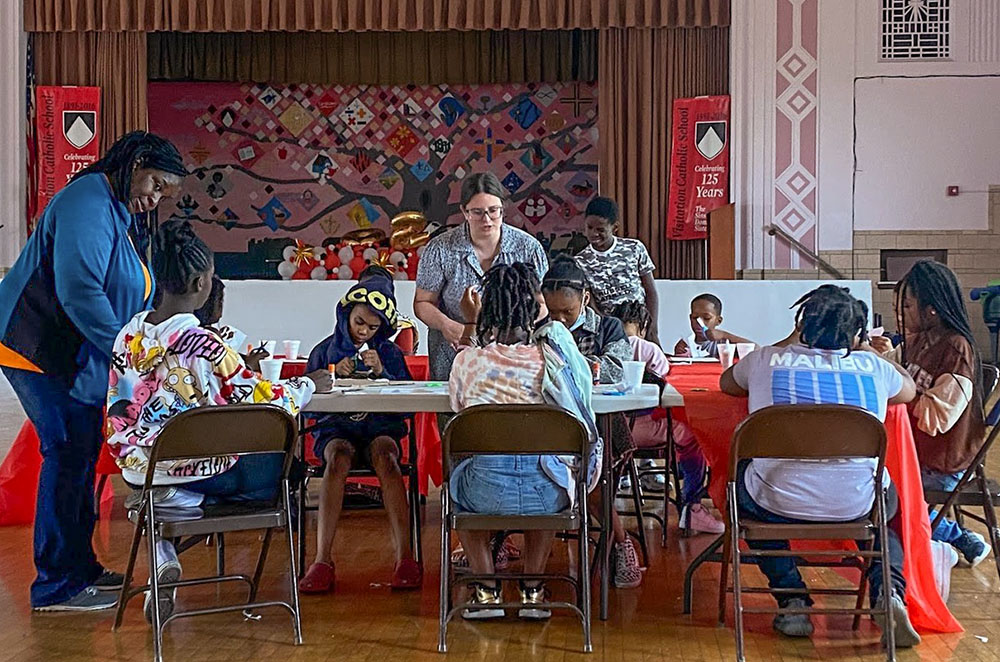
United Stand staff members Michelle Streety (left) and Monica Kaczmarczyk (center) assist children with an activity during one of the nonprofit’s afterschool programs. (Courtesy of United Stand)
Providing inclusive services
United Stand further addressed the issue that Chicago Catholic schools lacked special education services, said Leah Duszynski, recently retired as the Chicago Archdiocese's director of inclusive education.
"If private school students wanted to receive special education support, they were entitled, but they had to go into public schools during the school day [to receive it]," said Duszynski, adding that transportation wasn't provided. "Not many parents would be available in the middle of the day to take their child to a local public school, then pick them up and bring them back."
To remedy this, Mis collaborated with Duszynski in 2003 to build an inclusive education program from scratch, providing Catholic schools with on-site support for reading, writing, math and independent functioning. The first Archdiocesan Center for Inclusive Education opened in 2004.
Today, the program's inclusive education centers also conduct comprehensive testing to identify students' learning challenges.
"Our kids receive support in [their Catholic schools] during the school day," said Duszynski, 74, a former Catholic school teacher with a master's in reading and literacy. "This program is as strong as ever."
Advertisement
Chicago native Karen Grzenia lauds that United Stand's services transformed her son Alex's experience in Catholic schools.
Diagnosed with attention deficit hyperactivity disorder and oppositional defiant disorder, he encountered "challenge after challenge with teachers," Grzenia said, to the point he transferred schools and faced suspension in elementary school.
But after Alex enrolled in United Stand's counseling and inclusive education services in third grade, continuing through high school, his confidence and academic performance improved dramatically, Grzenia said. She attributes this to his success today in owning two guitar design companies.
"He loved his counselor," said Grzenia, 58. "He felt he had a sense of responsibility to his tutors. It just motivated him in a different way."
United Stand also offers parent support groups, and afterschool programs that provide a welcoming space for students "who have no safe place to go home to," Mis said.
These programs guide youths on regulating their emotions with yoga, theater, dance and meditation, teaching them techniques "that will enable them to help themselves," she said.
Continuing to support the mental health industry, United Stand receives hundreds of intern applications a year, giving college students hands-on experience with assessments, counseling and integrated services.
"No one really leaves," Mis said. "They all find ways to stay connected to the agency's mission to stand with the people of Chicago."

